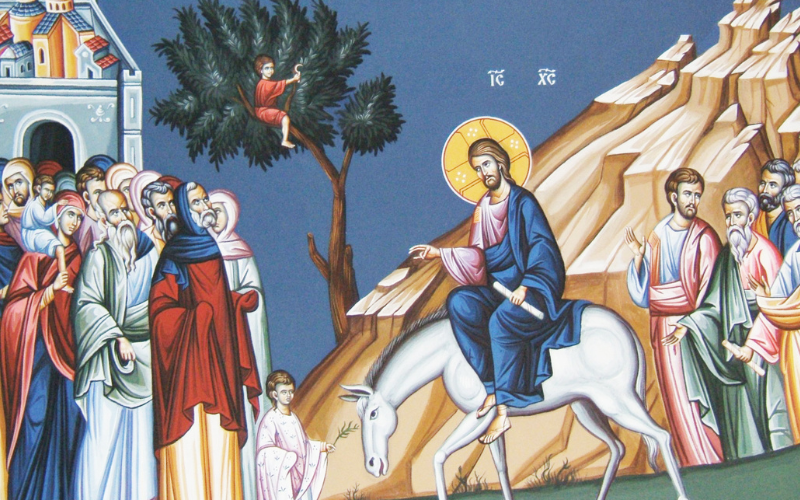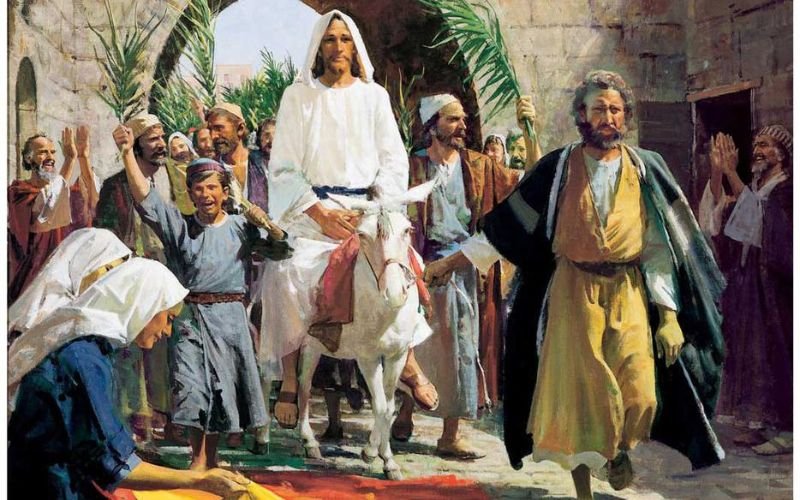Palm Sunday marks the beginning of Holy Week in the Christian calendar, a period of profound significance that leads up to Easter. It commemorates Jesus Christ’s triumphant entry into Jerusalem, an event rich in symbolism and prophecy. The Palm Sunday Bible verses offer a deep insight into the Passion Week, providing believers with a spiritual roadmap to understand the events leading to the crucifixion and resurrection of Jesus. In this article, we will explore how these verses illuminate the Passion Week, reflecting on their historical context, theological implications, and spiritual lessons.
1. The Significance of Palm Sunday
Palm Sunday is celebrated on the Sunday before Easter and is the culmination of the Lenten season. It is named for the palm branches that were laid before Jesus as He entered Jerusalem, a sign of honor and recognition of His messianic role. The event is described in all four Gospels, each providing a unique perspective on the significance of the day.
Matthew 21:8-11 states:
“Most of the crowd spread their cloaks on the road, and others cut branches from the trees and spread them on the road. The crowds that went ahead of him and those that followed shouted, ‘Hosanna to the Son of David! Blessed is he who comes in the name of the Lord! Hosanna in the highest heaven!’ When Jesus entered Jerusalem, the whole city was stirred and asked, ‘Who is this?’ The crowds answered, ‘This is Jesus, the prophet from Nazareth in Galilee.’”
This passage highlights the joyful reception Jesus received as He entered the city, symbolizing His role as the promised Messiah. The use of palm branches was a traditional Jewish symbol of victory and peace, signifying the people’s expectation of liberation from Roman oppression.
2. Prophetic Fulfillment and Messianic Expectations
The Palm Sunday account fulfills several Old Testament prophecies, reinforcing the belief that Jesus was the long-awaited Messiah. One of the key prophecies is found in Zechariah 9:9:
“Rejoice greatly, Daughter Zion! Shout, Daughter Jerusalem! See, your king comes to you, righteous and victorious, lowly and riding on a donkey, on a colt, the foal of a donkey.”
This prophecy depicts a humble king entering Jerusalem on a donkey, contrasting with the typical image of a conquering hero. By fulfilling this prophecy, Jesus demonstrated that His kingdom was not of this world but was rooted in peace, justice, and righteousness.
Another prophetic reference is from Psalm 118:25-26:
“Lord, save us! Lord, grant us success! Blessed is he who comes in the name of the Lord. From the house of the Lord we bless you.”
This psalm, recited by the crowds on Palm Sunday, reflects a cry for salvation and blessing, which the people associated with Jesus. The use of this psalm emphasizes the recognition of Jesus as the Savior and the fulfillment of divine promises.
3. Theological Implications of Palm Sunday
Palm Sunday is more than a historical event. It has profound theological implications that shed light on the nature of Jesus and His mission. The day encapsulates themes of humility, kingship, and prophetic fulfillment.
Humility and Servanthood
Jesus’ choice to ride on a donkey rather than a horse underscores His message of humility and servanthood. In a world where kings were often depicted riding majestic steeds, Jesus’ humble entry signifies His mission to serve rather than to be served. This humility is central to the teachings of Jesus and is reflected throughout His ministry.
The Nature of Jesus’ Kingdom
Jesus’ entry into Jerusalem reveals the nature of His kingdom, which is characterized by peace and righteousness rather than earthly power and dominance. This entry challenges conventional expectations of a political Messiah and invites believers to understand His reign as a spiritual reality.
The Role of Prophecy
The fulfillment of Old Testament prophecies on Palm Sunday highlights the continuity between the Old and New Testaments. It demonstrates that Jesus’ life and mission were part of a divine plan unfolding through history. Understanding these prophecies deepens the appreciation of Jesus’ role in salvation history.
4. Palm Sunday and the Passion Week: A Spiritual Journey
Palm Sunday initiates a week of intense spiritual reflection, culminating in the events of Good Friday and Easter Sunday. The Palm Sunday Bible verses set the stage for the unfolding drama of the Passion Week, providing a lens through which to view the subsequent events.
From Triumph to Tragedy
The joyous reception of Palm Sunday quickly shifts to the somber events of the Passion Week. The same crowd that welcomed Jesus with praise would soon turn against Him, highlighting the fickle nature of public opinion and the depth of Jesus’ sacrifice.
The Cleansing of the Temple
Immediately following His entry into Jerusalem, Jesus cleanses the Temple, as described in Matthew 21:12-13:
“Jesus entered the temple courts and drove out all who were buying and selling there. He overturned the tables of the money changers and the benches of those selling doves. ‘It is written,’ he said to them, ‘My house will be called a house of prayer, but you are making it a den of robbers.’”
This act signifies Jesus’ authority over religious practices and His commitment to purifying worship. It sets the stage for the conflict that will intensify throughout the week.
The Last Supper and the New Covenant
As the week progresses, Jesus shares the Last Supper with His disciples. Instituting the Eucharist and revealing the new covenant through His impending sacrifice. The events of the Last Supper are a crucial aspect of the Passion Week, emphasizing the themes of betrayal, sacrifice, and redemption.
The Garden of Gethsemane and the Arrest
In the Garden of Gethsemane, Jesus’ anguish and submission to God’s will highlight the depth of His suffering and the weight of the impending crucifixion. His arrest, trial, and crucifixion are pivotal moments that are foreshadowed by the events of Palm Sunday.
5. Spiritual Lessons from Palm Sunday
The Palm Sunday Bible verses offer valuable spiritual lessons that resonate throughout the Passion Week and beyond. These lessons include:
The Call to Humility
Jesus’ humble entry into Jerusalem challenges believers to embrace humility and servanthood in their own lives. It encourages a shift from seeking worldly power to embodying the virtues of compassion and service.
The Invitation to Reflect on Jesus’ Mission
Palm Sunday invites believers to reflect on the nature of Jesus’ mission and the meaning of His sacrifice. It is a time to contemplate the depth of God’s love and the significance of Jesus’ role as Savior.
The Importance of Spiritual Vigilance
The rapid transition from Palm Sunday’s celebration to the events of Good Friday serves as a reminder of the importance of spiritual vigilance and preparedness. It underscores the need for ongoing faithfulness and devotion in the face of life’s challenges.
Conclusion
Palm Sunday is a profound and multifaceted event that illuminates the Passion Week through its rich biblical, theological, and spiritual dimensions. The Bible verses associated with Palm Sunday provide a window into the significance of Jesus’ entry into Jerusalem. The fulfillment of prophetic promises, and the nature of His kingdom. As believers journey through the Passion Week, these verses serve as a guide, offering insight into the profound truths of Jesus’ mission and the transformative power of His sacrifice.
By reflecting on the Palm Sunday Bible verses, Christians can gain a deeper appreciation of the events leading up to Easter and cultivate a greater sense of spiritual awareness. The journey from the triumphant entry to the crucifixion and resurrection is not merely a historical account. A living testament to the enduring message of hope, redemption, and divine love that continues to inspire and transform lives today.



